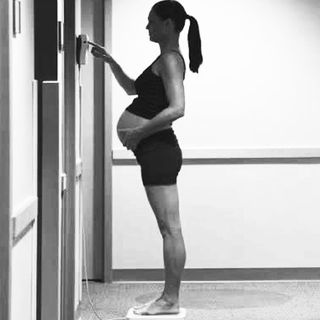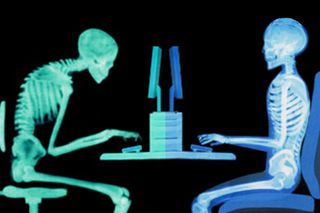
The Health Effects of Slouching Range from Acidity to Low Sex Drive
Looks like mom was right …

Most people who come in for treatment don’t know they have bad posture, says Sandhya Shah, a physiotherapist in Vapi, Gujarat.Most come because they’re in pain, she says, which is the primary health effect of slouching — neck pain, back pain, knee and foot pain, arm pain, shoulder pain, jaw pain, headaches.
“It’s all connected,” she says, describing the spine’s relationship with the rest of the body.
Shah describes the posture of someone working at their computer or using their phone — lower back rounded, shoulders hunched, and head jutting forward. It’s a posture most people are intimately familiar with, to the extent that recent, and highly questionable, reports that this posture is causing humans to evolve horn-like bone growths in their necks were met with widespread hysteria — and belief. (The reports have since been discredited.)
Perhaps the pervasiveness of slouching — what most of us consider normal sitting posture at this point — is why we don’t necessarily connect it to our health problems. Yet, Shah says, the health problems of 70% of her patients are rooted in poor posture.
The pain primarily comes from muscles weakened by poor sitting habits. “When you have bad posture, one side of the muscles get stretched, and the opposite side, the muscles get shortened,” she explains.
This overwork on one side and underdevelopment on the other have a domino effect, she says. Poor posture particularly weakens core muscles, and weak core muscles can lead to many other health effects.
Related on The Swaddle:
A Combination of Exercise and Calorie Restriction Could Negatively Impact Bone Health
Many of these may not strike the sufferer as being connected to posture. The extra pressure slouching puts on the abdomen, the muscles of which are weakened by poor posture, can stress the pelvic floor muscles, and consequently weaken them. The result could contribute to stress incontinence, wherein the pelvic floor muscles are unable to help you hold in urine, and the abdominal pressure on the bladder forces some out, according to Meghan Markowski, a physical therapist at Brigham and Women’s Hospital in the U.S.
Pelvic floor muscles weakened, in part, by poor posture can have other effects. Sitting with a rounded lower back “can have profound effects on men’s and women’s sexual function because this posture shortens and tightens the pelvic floor muscles, which are our primary sexual muscles,” Isa Herrera, an author, and physical therapist in New York City, told U.S. News in 2018. “When the pelvic floor muscles are tight and weak, they cannot exert their power and strength, and the end result can be weak or nonexistent orgasms,” less sexual arousal, less stamina, or weak ejaculations, she adds.
The abdominal pressure from slouching puts pressure on additional organs, too. “Slouching puts pressure on the abdomen, which can force stomach acid in the wrong direction,” Dr. Kyle Staller, a gastroenterologist at Massachusetts General Hospital, told Harvard Health Publishing. “And some evidence suggests that transit [of waste] in the intestines slows down when you slouch. In my opinion, it probably does play a small role.”
The undue pressure slouching exerts on the body’s main cavity can also affect breathing, preventing individuals from taking in full breathes of air and their organs from getting enough oxygen. It can also contribute to poor circulation or worsen circulation problems, according to the U.S. News report.
All of this extra physical stress can take a toll on energy and mood, contributing to physical fatigue and, perhaps, even low, depressive mood, some (inconclusive) studies suggest.
Unfortunately, “I don’t think there is much awareness,” Shah says. She says as much of her work focuses on prevention and awareness as it does involve treating poor posture. She gives presentations locally on good sitting posture (engage the core abdominal and lower back muscles; “how it feels when you have a pillow behind your lower back – that’s how you have to sit”), good sleeping posture, and good weight-lifting posture. She discourages wearing high heels regularly, as it stresses back and calf muscles.
And ultimately, she encourages exercise.
“When you’re young, your muscles are strong. After age 30, if you don’t exercise, they weaken,” she says. “People have to continuously take care of their muscles and exercise them. Weak muscles give rise to bad posture.”
Liesl Goecker is The Swaddle's managing editor.
Related


In Major Breakthrough, Experimental TB Vaccine First to Show Success in 3‑Year Trial
